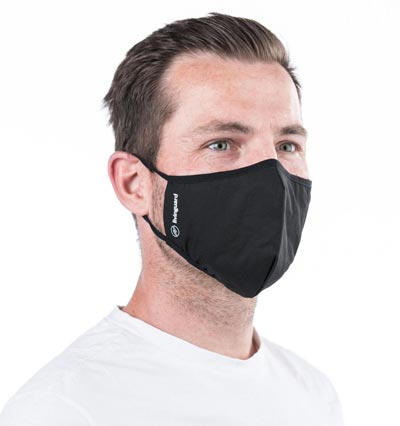
Innovative Textiles for Masks Inactivate SARS-CoV-2 in Studies

Man with face mask
Image Credit: © Livingard
The photo is available for media representatives to download. It is free of charge if used in the context of the press release and the source is cited.
The Swiss company Livinguard has developed a treatment for textile facial masks that can directly inactivate bacteria and viruses. While researchers at the Institut für Textiltechnik (ITA) of RWTH Aachen University conducted experiments on the chemical and physical properties of various textiles for face masks, researchers at Freie Universität Berlin were able to demonstrate that these new textiles can reduce high amounts of SARS-CoV-2 virus particles by up to 99.9% within a few hours.
“The textiles in these masks can thus continuously inactivate the exhaled viruses and can make handling these masks even safer overall,” says Professor Dr. Uwe Rösler, Institute for Animal and Environmental Hygiene. “In addition, such textiles could also help to reduce hygienic issues in other general and medical areas, even beyond COVID-19.”
The novel corona virus SARS-CoV-2 can be transmitted through airborne droplets and aerosols. For this reason, governments and health authorities worldwide, including the WHO, recommend wearing face masks to protect other people and, to a small extent, oneself. These face masks can hold back SARS-CoV-2-containing droplets that occur when you exhale, cough and sneeze.
However, great care must be taken when handling contaminated face masks: After use, either the masks must be disposed of, or the viruses can be inactivated by washing at higher temperatures or by microwave treatment.
The principle underlying the Livinguard Technology is that the textile surface has a strong positive charge. When microbes come into contact with the technology, the microbial cell, which is negatively charged, is destroyed, leading to permanent destruction of the microorganism.
Unlike alternative metal-based solutions, the novel technology has been found to be safe for both skin and lungs. Moreover, Livinguard Technology is very sustainable, allowing users to reuse the mask up to 200 times with no reduced impact on safety or efficacy.
Further Information
About the Institut für Textiltechnik (ITA) of RWTH Aachen University:
The core of the ITA Group is the research and teaching institution, the Institut für Textiltechnik of RWTH Aachen University, short ITA, www.ita.rwth-aachen.de. The ITA Group is an international research and training service provider for fiber-based high-performance materials, textile semi-finished products, and their manufacturing processes with about 400 employees.
Contact person:
Dr. David Schmelzeisen, Institut für Textiltechnik of RWTH Aachen University, Tel.: +49 (0)152 294 416 41, Email: David.Schmelzeisen@ita.rwth-aachen.de
About the Institute for Animal Hygiene and Environmental Health, Freie Universität Berlin:
The Institute for Animal and Environmental Hygiene (ITU) is dedicated to the study of hygiene in veterinary medicine, consumer and environmental protection, and the control of zoonotic infectious diseases. Research in these areas is conducted through national and international interdisciplinary research networks.
Contact person:
Professor Dr. Uwe Rösler, Institute for Animal and Environmental Hygiene, Freie Universität Berlin, Tel.: +49 (0) 30 8385 1845, Email: uwe.roesler@fu-berlin.de
About Livinguard:
Livinguard is an environmentally friendly hygiene technology platform based in Zug, Switzerland. As the first company in the world to empower textiles and other materials with self-disinfecting properties, it licenses its patented technologies to companies from various industries to improve the health and well-being of consumers. Livinguard AG operates in Switzerland, Germany, USA, Singapore, Japan, India, and South Africa.
Contact person:
Victoria Banaszak, Tel.: +41 41 726 16 76, Email: victoria.banaszak@livinguard.com














